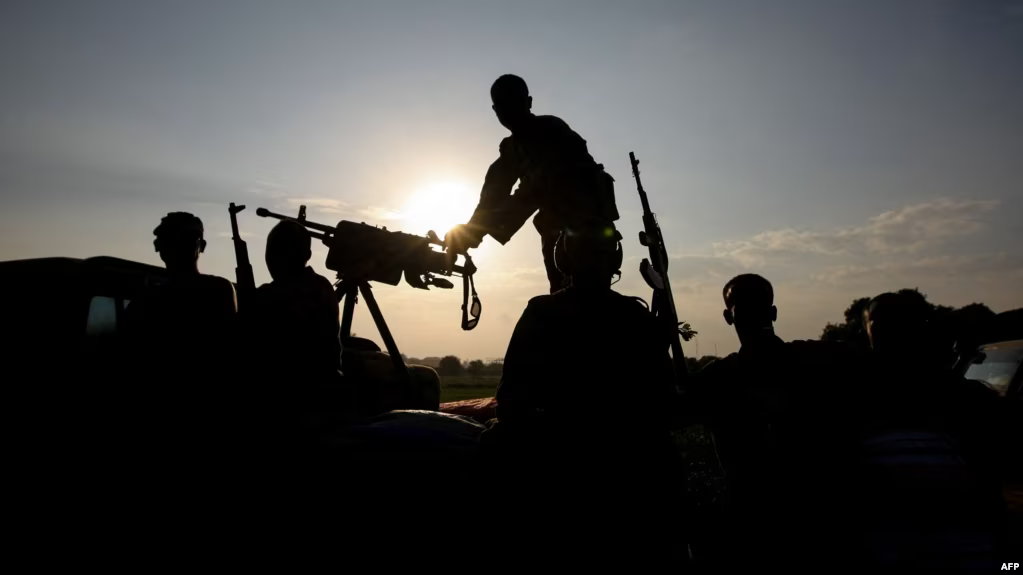US Sends Weapons to Somalia to Combat Al-Qaeda-Linked Organization
Somali army stationed in the Middle Shabelle region of Somalia. Photo: Stuart Price / VOA news
The United States recently bestowed over 60 tons of weapons to Somalia this past Tuesday to be used in their continued war against al-Qaeda.
The US embassy in Mogadishu confirmed that this gesture was to assist the Danab Brigade, a highly-trained Somali commando force, in fighting against the al-Qaeda-linked terrorist organization al-Shabab.
As the dispute between al-Shabab and the Somali government continues, there’s also been additional conflict in the breakaway region of Somaliland, between soldiers and pro-Somalian rebels. Representatives from nations such as the US, Britain, the United Arab Emirates, and Turkey expressed concern over the ongoing war in a summit this week.
The US state department recently issued a joint statement in its aftermath, stating, “The partners expressed concern about the ongoing conflict ... and called on all parties to adhere to the ceasefire, de-escalate, allow unhindered humanitarian access, and engage in constructive and peaceful dialogue.” There was an agreement to provide more international security assistance to the state.
Last year, Somali President Hassan Sheikh Mohamud declared “total war” against al-Shabab, beginning a revolution against the militant group whose vision is to establish a conservative Islamic state. This declaration of war was a response to bombings that wounded over 100 Somalis and killed at least 21 others.
Considered to be the deadliest branch of al-Qaeda, Somalia has been terrorized by al-Shabab for nearly two decades. Al-Shabab’s harsh taxation policies and human rights abuses compelled the Somalian population to begin revolting against their control. Their actions were supported by the Somalian government, which only recently embarked on a greater effort to expel the militants due to lack of support.
Al-Shabab gained control of Somalia decades ago years ago after the Battle of Mogadishu. 18 American soldiers were killed during the conflict between Somali militia and US armed forces. Due to these casualties, the US retreated, and Somalia eventually fell under the majority control of Al-Shabab.
In 2014, the US rekindled its relationship with Somalia in an effort to promote security, governance, and development. To eliminate the terrorist organization from the country, the US began training Somalian soldiers. However, President Trump withdrew the US army during his time in office, temporarily ending the training in the process.
Last year, President Bidenrevisited the issue and the US military once again found itself on Somalian soil.
Somali soldiers attend their graduation ceremony. Photo: Diana Zeyneb Alhindawi / The New York Times
While al-Shabab mainly inhabits Southern Somalia, the terrorist group has found its way into the Northern regions, prompting fear and concern.
The neighboring governments of Ethiopia, Kenya, and Djibouti are confirmed to have collaborated with the Somalian government to take action against the militants. After a meeting in Somalia’s capital, the countries issued a joint statement.
“The Summit agreed to make the final push for joint operations in the areas that remain under the terrorists to completely liberate the whole of Somalia from Al-Shabab.”
To encourage the expulsion of the al-Shabab from Somali regions, the US announced a $5 million reward for the capture of the militant leader, Ali Dheere, most commonly known as “Rage.”
In 2008, al-Shabab was declared both a Foreign Terrorist Organization and a Specially Designated Global Terrorist entity by the US Government. Its leader, Ali Mohamed Rage, only became a target for the US military in August of 2021, with the Department of State declaring him a Specially Designated Global Terrorist.
In addition to war, Somalia is currently in the middle of the worst drought it has ever experienced. In the same meeting, the State Department and its allies issued another statement focusing on the hidden costs of Somalia’s militaristic and environmental devastation.
“The partners also expressed concern about the ongoing humanitarian crisis driven by Somalia’s worst drought on record. They welcomed support along with international actors to meet the immediate needs of the Somali people, while also strengthening Somalia’s ability to withstand future climate shocks.”


